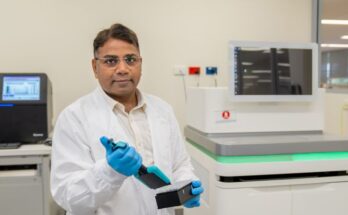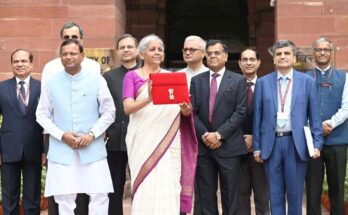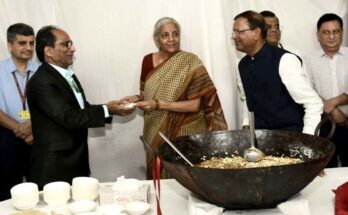The Royal Society of London has announced a list of 80 outstanding researchers and innovators and communicators from around the world elected to its fellowship for 2023. Among these is Professor Rajeev Varshney, who is now with Murdoch University (Australia) as Director of the Centre for Crop & Food Innovation; Western Australian State Agricultural Biotechnology Centre; and International Chair in Agriculture & Food Security. He is the only Indian scientist elected as FRS (Fellow of the Royal Society) in the year 2023.
This impressive induction will make Prof. Varshney the fourth Indian agricultural research scientist to receive this fellowship. The other three Indian agricultural scientists elected as FRS include Prof. BP Paul (elected in 1972), Prof. MS Swaminathan (1973) and Prof. Gurdev Khush (1995).
Professor Varshney said, “I feel humbled and honoured to have been elected as a Fellow of the Royal Society. This is like a dream come true for any scientist. I am thrilled to be included alongside the stalwarts and giants such as Norman Borlaug, MS Swaminathan, Jim Peacock, and Gurdev Khush, who have been inspirations and role models not only for me but all agricultural scientists across the world.” He added, “I am grateful to my colleagues and collaborators from Australia, India, Germany, and many countries in Asia, Africa, and America with whom I had the privilege of working with over the last 25 years.”
You may also like to read: Incentivising agri-seed research & development is key to food security, recommends study
Currently, Prof. Varshney’s Murdoch University-based team is working on improving wheat, legume and horticultural crops for agronomic and abiotic stress tolerance traits by developing and deploying novel genomics approaches such as pangenomics, haplotype cataloguing and functional genomics approaches.
Murdoch University Vice Chancellor Professor Andrew Deeks congratulated Professor Varshney, saying his election was a testament to a lifelong commitment to academic excellence. “Professor Varshney embodies the philosophies Murdoch University was built on and continues to espouse today,” he said. “Throughout his research, he has kept a keen focus on sustainability that has impacted the lives of some of the world’s most vulnerable people. He is a very fitting recipient of this high honour and we are very proud to have him as Murdoch’s first Royal Society fellow.”
The Royal Society, founded in 1660, is the oldest continuously existing scientific academy in the world that unites the most eminent scientists, engineers and technologists from all over the world. To date, there are approximately 1,700 fellows and foreign members, including up to 85 Nobel laureates. Each year at least 52 fellows and up to 10 foreign members are elected from a group of around 800 candidates who are proposed by the existing fellowship. Past fellows and foreign members of the Royal Society have included Charles Darwin, Lise Meitner, Albert Einstein, Dorothy Hodgkin, and Stephen Hawking.
You may also like to read: G20 MACS emphasises on digital agriculture, sustainable agri value chain & PPP in Agri R&D
While congratulating Prof. Varshney on this recognition, Dr Himanshu Pathak, Secretary, Department of Agricultural Research and Education, Government of India and Director General, Indian Council of Agricultural Research (ICAR), said, “It is a great recognition for Indian agricultural science that an Indian agricultural scientist based on the work done in India has been recognised by the Royal Society, an apex learned body of the world.”
Prof. Varshney’s contribution to food and nutrition security
Prof. Varshney has been recognised by the Royal Society for his seminal work on integrating genomic discoveries in crop improvement for developing climate-resilient and nutritious legume crop varieties. While working at the International Crops Research Institute for the Semi-Arid Tropics (ICRISAT), Hyderabad for 17 years (2005-2022), in collaboration with research institutes of ICAR, state agricultural universities and other organisations in India, and many countries in Africa, Europe, North America, and Australia. Prof. Varshney has decoded the genome of 12 tropical crops, analysed genetic variation in more than 5000 lines of legumes and dissected more than 30 agronomic traits at the molecular level in each of three legume crops namely chickpea, pigeonpea and groundnut. Furthermore, the seminal contribution of Rajeev Varshney and his colleagues is the translation of genome research to develop improved superior legume crop varieties. For instance, India released eight chickpea varieties for drought tolerance and Fusarium wilt resistance, two high-oleic groundnut varieties, and one Fusarium wilt-resistant pigeon pea variety. Similarly, Ethiopia has released two drought-tolerant chickpea varieties. Development and release of several other legume crop varieties are in the advanced stage in Ethiopia, Kenya, Tanzania and Mali.
You may also like to read: How carbon credit programmes can benefit farmers while combating climate change?
In addition, Prof. Varshney’s contribution and leadership in the area of promoting superior varieties and providing access to high-quality seeds to farmers, through projects funded by the Bill & Melinda Gates Foundation (BMGF), and the Ministry of Agriculture & Farmers Welfare of Government have contributed to increasing the productivity and production of these legume crops and thereby the income for poor farmers in more than 13 countries in Africa, and several states in India including Andhra Pradesh, Karnataka, Madhya Pradesh, Maharashtra, Rajasthan, Telangana, and Uttar Pradesh. An economic analysis has measured reaching benefits of Prof. Varshney’s legumes research to about 25 million people in 15 countries in Africa and Asia. In addition, Prof. Varshney and his colleagues have trained 450 scientists in India and developing countries in Africa and South America. A scientific community trained in the modern approach to crop improvement will go a long way. This will be helping developing countries to integrate genomics into crop improvement programmes for enhancing crop productivity and quality to ensure food and nutrition security.
Prof. Gurdev Khush, FRS, and the World Food Prize awardee on the election of Prof. Varshney said, “It is great to see Fellow of the Royal Society being bestowed to Prof. Varshney, who has not only excelled in science but also in its application to solve the downstream problem of food security and poverty alleviation in less endowed regions of the world.”




